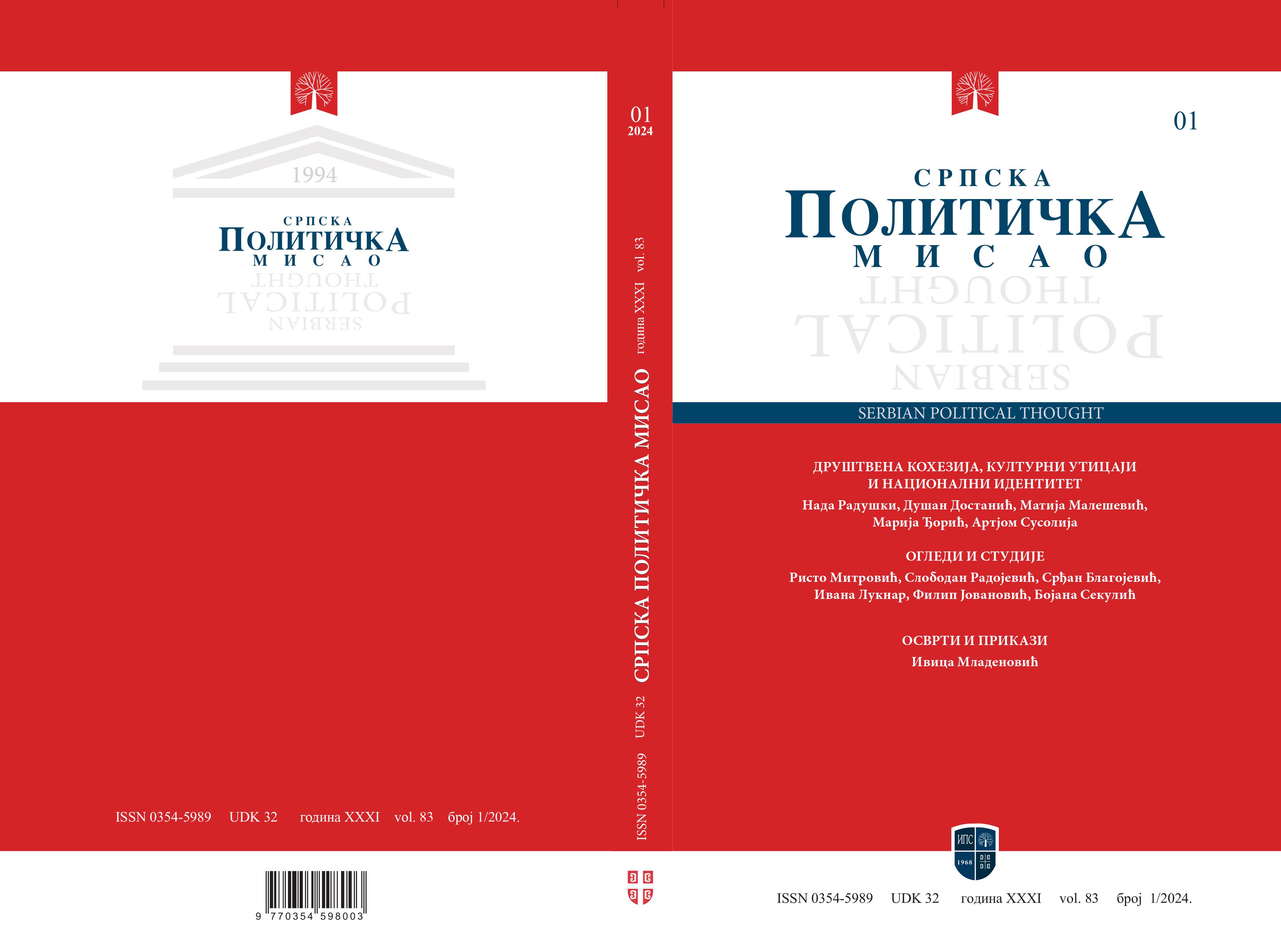National Interest of the Republic of Serbia for Participation of Serbian Armed Forces in Peacekeeping Operations
Abstract
Peacekeeping operations are one of the instruments for resolving crises in the world and preventing armed conflicts that threaten global peace and security. This article argues that the participation of the Serbian Armed Forces in UN missions contributed to the peacekeeping in the world and produced positive benefits for the country. Namely, Serbian Armed Forces inherits the tradition of many years of participation in UN and EU peacekeeping operations. This article first reviews the most relevant milestones of Republic of Serbia’s contribution to peacekeeping operations, focusing on the important role played by defence and foreign policies in national development and international cooperation. This is followed by a presentation of national legislation governing the participation of military personnel in peacekeeping operations. Therefore, peacekeeping operations are recognized as a type of multilateral mechanism for achieving cooperation between the Republic of Serbia and UN/EU and a contribution to building trust and the position of a reliable partner in international relations. The theory of international relations that explains such actions of states is the realism theory. In accordance with realists school of thought, state national interests for participation in peacekeeping operations are military security issues, national and strategic interests as well as economic interests, and increased credibility and power of stаtes in international relations. Starting from the fact that global security is comprehensive and indivisible, states are even more interested in participating in peacekeeping operations and perceive it as their national interests and an element of foreign and security policy. This is the initial thesis from which the authors base their analysis presented in the paper.
References
Chun, Kwang Ho, and Eugene Lee, 2016. “Serbian Accession to the EU and CSDP Engagement: Crisis Management in Reworking.” The Journal of Eurasian Studies 13(1): 213-232. doi: 10.31203/aepa.2016.13.1.011.
Constitution of The Republic of Serbia, “Official Gazette of the Republic of Serbia”, No. 98/06.
Cronin, Bruce, 2010. “Security Regimes: Collective Security and Security Communities.” Oxford Research Encyclopedia of International Studies. doi: 10.1093/acrefore/9780190846626.013.296.
Defense Strategy of the Republic of Serbia, “Official Gazette of the Republic of Serbia”, No. 94/19.
Findlay, Trevor. 1996. The new peacekeeping and the new peacekeepers. In Challenges for the New Peacekeepers, ed. Trevor Findlay, 1-31. Oxford: Oxford University Press.
Hutabarat, Leonard F. 2014. “Indonesian Participation in the UN peacekeeping as an Instrument of Foreign policy: Challenges and Opportunities.” Jurnal Global dan Strategis (Global & Strategis), 8 (2): 183-199. ISSN 1907 9729.
Ignjatijević, Marija. 2018. The importance of building interoperability of Serbian Armed Forces for participation in multinational operations. Belgrade: Belgrade Centre for Security Policy.
Ishizuka, Katsumi. 2003. “Peacekeeping and National Interests: Positive Factors Influencing Potential Contributing States.” Kyoei University Repository (2003): 1-40.
Jukić, Jadranko K., Rade V. Slavković, and Aleksandar D. Dumić, 2017. “Impact of the geopolitical environment on the execution of the UNIFIL multinational operation in Lebanon.” Vojno delo. 69(3): 28-42.
Law on Defense, Accsessed 10 March 2022.
https://www.mod.gov.rs/multimedia/file/staticki_sadrzaj/dokumenta/zakoni/Law%20on%20Defense.pdf.
Law on the Serbian Armed Forces, “Official Gazette of the Republic of Serbia”, No. 116/07 and 88/09 and in the “Official Military Gazette”, No. 34/07 and 31/09. Accsessed 10 March 2022. https://www.mod.gov.rs/multimedia/file/staticki_sadrzaj/dokumenta/zakoni/Law%20on%20the%20SAF.pdf
Law on Participation of the Serbian Armed Forces and Other Defense Forces in Multinational Operations outside the Borders of the Republic of Serbia, “Official Gazette of the Republic of Serbia”, No. 88/09
Meiske, Maline, and Andrea Ruggeri. 2017. “Peacekeeping as a Tool of Foreign Policy.” In Oxford Research Encyclopedia of Politics. Oxford: Oxford University Press. https://doi.org/10.1093/acrefore/9780190228637.013.462
Milošević, Marko. 2014. “Serbian civilian capacities for peace operations: untapped potential.” Journal of Regional Security. 9(2): 165-183.
Multinational operations, Multinacionalne operacije. Accsessed 23 November 2022. http://www.mnop.mod.gov.rs/
National Action Plan for the Implementation of UN Security Council Resolution 1325 – Women, Peace and Security in the Republic of Serbia (2017–2020), Accsessed 18 May 2023. http://1325naps.peacewomen.org/wp-content/uploads/2020/12/Serbia_NAP-1.pdf.
Parliamentary assembly of BiH, Procedura upućivanja pripadnika oružanih snaga u misije u inozemstvu, komparativni pregled, 2011. Accsessed 22 November 2022.
https://www.parlament.ba/Publication/Read/3957?title=procedura-upucivanja-pripadnika-oruzanih-snaga-u-misije-u-inozemstvu-&pageId=0.
Peacekeeping Operations Centre, Serbian Armed Forces. Accessed 11 November 2022. https://www.vs.rs/en/units/serbian-armed-forces/general-staff/operations-department-j3/peacekeeping-operations-centre.
Peacekeeping Operations Centre, Serbian Armed Forces. 2023. Presentation by LtCol Marko Marjanović, 24/11/2023.
Pugh, Michael. 2004. “Peacekeeping and critical theory.” International peacekeeping 11(1): 39-58. doi: 10.1080/1353331042000228445
Simić, Dragan R., 2002. Nauka o bezbednosti: savremeni pristupi bezbednosti, Belgrade: Official Gazette of the Federal Republic of Yugoslavia and the Faculty of Political Sciences
Slobodan Radojević, Svetislav Šoškić, & Goran Radić, 2017. “Analysis of Serbian military riverine units capability for participation in the United Nations peacekeeping operations.” TransNav: International Journal on Marine Navigation and Safety of Sea Transportation 11(2): 371-376.
Songying, Fang, Xiaojun Li, and Fanglu Sun. (2018). “China’s Evolving Motivations and Goals in UN Peacekeeping Participation.” International Journal: Canada's Journal of Global Policy Analysis. 73(3): 464–473. doi: 10.1177/0020702018795898.
Szilvágyi, Tibor, 2020. “Serbia’s Military Neutrality and What Is Behind It.” National Security Review. Issue 1: 100-128.
UN Peacekeeping, Accsessed 10 June 2022. https://serbia.un.org/en/135770-united-nations-thanks-serbia-its-contribution-peacekeeping.
United Nations Peacekeeping Operations – Principles and Guidelines. 2008. The Department of Peacekeeping Operations and the Department of Field Support
Ministry of Defence, 26.09.2015. Visiting Serbian peacekeepers in the UNIFIL mission in South Lebanon, Accsessed 25 May 2022. https://www.mod.gov.rs/eng/8772/u-poseti-srpskim-mirovnjacima-u-misiji-unifil-na-jugu-libana-8772.
Ministry of Defence. 17.11.2022. Ceremony to mark Peacekeeping Operations Centre Day and 20th anniversary of Serbian Armed Forces’ participation in multinational operations, Accsessed 13 November 2023. https://www.mod.gov.rs/eng/19451/obelezen-dan-centra-za-mirovne-operacije-i-20-godina-ucesca-vojske-srbije-u-multinacionalnim-operacijama19451
Žižić-Borjanović Slavica, and Ljiljana Vučković-Dekić, 2009. “An act of humanity.” Vojnosanitetski pregled. 66(3): 253-254.
Zotović, Mileva, 2018. “The second mission of the Serbian Armed Forces: Genesis, characteristics and media treatment.” Vojno delo 70(1): 63-77. doi: 10.5937/vojdelo1801063Z

